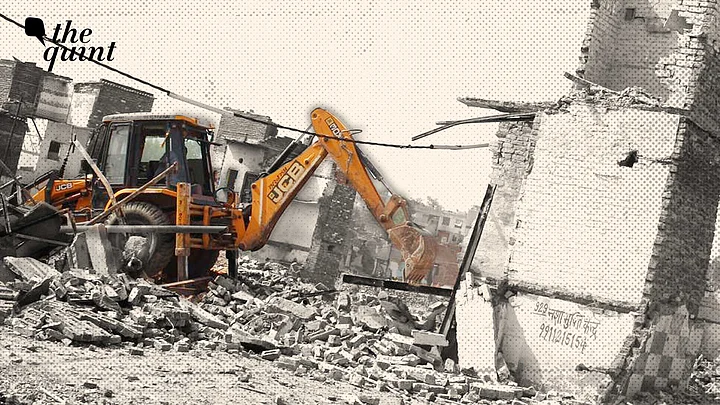In Delhi, one government agency demolishes your home. Another threatens to delete your vote for not having one. This contradiction isn’t just cruel—it’s systemic. On 5 June 2025, the Delhi Development Authority (DDA) demolished 344 homes in Bhumiheen Camp, Govindpuri.
Most residents had lived there for decades. They held ration cards, Aadhar IDs, voter IDs. Still, with just a 72-hour pasted notice and no proper rehabilitation plan, everything was flattened—homes, medicines, schoolbooks, and entire lives, buried beneath bulldozer dust.
A Season for Demolitions
This is not an isolated incident. Since February 2025, Delhi has seen a wave of large-scale demolitions across low-income settlements: Mehrauli, Tughlakabad, Gyaspur, and most recently, the Yamuna floodplains. These evictions, often carried out without proper notice or hearings, have displaced thousands. The reasons cited rarely hold up.
In Wazirpur, demolitions were justified in the name of railway safety. In Madrasi Camp, residents were blamed for monsoon flooding and blocking the Barapulla canal.
These claims crumble under scrutiny. These aren’t planning decisions—they’re excuses from a city that’s failed to plan at all. The irony deepened in Bhumiheen Camp just days after the demolitions, when several residents received letters from the Election Commission of India: “You are registered at [your address]. Please confirm if you still reside here, or your name may be deleted from the electoral roll.”
Displacement is swiftly followed by disenfranchisement. Poor, informal workers and migrant citizens are trapped in a bureaucratic spiral designed to erase them.
A home once gave them proof of address, eligibility for welfare, and a political voice. With one demolition, all three are taken away. Whether the Election Commission’s timing was deliberate or just poor coordination, the outcome is the same: the state is wholly working against its citizens. The political context is impossible to ignore.
Poll Politics to Disenfranchisement
After the BJP’s win in the Delhi Assembly elections in February 2025, Chief Minister Rekha Gupta’s administration has taken an aggressive stance on “unauthorised encroachments.”
Yet, while bogus promises remain unfulfilled and welfare schemes introduced by the previous government rolled back, there is no clarity on how the poor fit into this new vision for the city. Many of the residents evicted today had voted for the BJP just months ago.
On camera, several admitted as much.“We made a mistake,” one said. “They took our vote, then took our house. Now they know we won’t vote for them again—so they’re making sure we can’t vote at all.”
Their anger is unfiltered, but clear-eyed: “Humein toh barbaad kar diya,” they claim.
It’s common knowledge that the BJP had deployed strong hands in some of these settlements for months before the elections—offering reassurance, assistance with documents, and promises of inclusion. That political machinery is now nowhere to be seen. The same leaders who courted these communities have gone silent.
It must take a very deliberate political will to attack the most vulnerable. The worst affected are often internal migrants who came to Delhi decades ago in search of work. They built homes, raised families, invested their lives here. Their children go to school in this city. Now, they are discarded in the name of “questionable legalities.”
These are the discarded citizens. No one is safe from the agencies. These demolitions violate citizenship and fundamental rights—they destroy the very idea of justice.
For those affected, the loss is total. Which is why demolition laws are supposed to be rigid, and procedures must be followed. The Supreme Court has upheld these principles—offering clear directives against arbitrary evictions. But the bulldozer, too often, moves faster than justice.
Who is Accountable for Rehabilitation?
So, what does one do when state agencies, courts, and civic bodies act without accountability? Where do the vulnerable turn when even their existence is rendered illegal?
Meanwhile, those in charge at the municipal, state, and national levels, continue the spectacle of power.
High on hyperbole, the Prime Minister travels the world, winning accolades for representing the citizens of the world’s largest democracy. Back home, those very citizens must first prove they exist. To prove citizenship, they must show documents—often destroyed in the demolitions.
To get those documents, they need an address.
To keep an address, they must survive bulldozers.
But between inflation, joblessness, poor infrastructure, and endless paperwork, the citizen must keep playing the game. A game rigged against them. And Delhi’s new government is a brutal opponent.
(Abhinandita Mathur has worked as an advisor to the Aam Aadmi Party (AAP) government in Delhi. She recently completed a degree in law and has a keen interest in land-related laws. This is an opinion piece, and the views expressed above are the author’s own. The Quint neither endorses nor is responsible for the same.)
